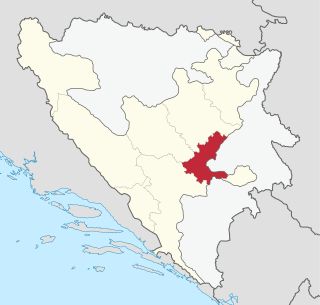
Financial regulation is a form of regulation or supervision, which subjects financial institutions to certain requirements, restrictions and guidelines, aiming to maintain the integrity of the financial system. This may be handled by either a government or non-government organization. Financial regulation has also influenced the structure of banking sectors by increasing the variety of financial products available. Financial regulation forms one of three legal categories which constitutes the content of financial law, the other two being market practices, case law.
Obrad Piljak ; 1933 – 7 April 2013) was a Bosnian politician and former Chairman of the Presidency of Bosnia and Herzegovina, from April 1989 to December 1990. He was the last nominated (non-elected) member of the Communist party of Bosnia and Herzegovina to serve as Presidency chairman, before the first multi-party elections were held in 1990 and Alija Izetbegović replaced him in his post.
The European Banking Federation was established in 1960. The EBF is the voice of Europe’s banking sector in all regulatory debates at European and global level. It represents 32 national banking Associations representing 3500 banks and about two million employees.

The Sarajevo Canton, officially the Canton of Sarajevo is one of 10 cantons of the Federation of Bosnia and Herzegovina in Bosnia and Herzegovina. Its cantonal capital is Sarajevo, also the capital city of Bosnia and Herzegovina.

The ten cantons of the Federation of Bosnia and Herzegovina, are the member states of the Federation of Bosnia and Herzegovina, one of the two political entities of Bosnia and Herzegovina. The ten cantons were established by the Law on Federal Units (Cantons) on 12 June 1996.
Bank regulation is a form of government regulation which subjects banks to certain requirements, restrictions and guidelines, designed to create market transparency between banking institutions and the individuals and corporations with whom they conduct business, among other things. As regulation focusing on key actors in the financial markets, it forms one of the three components of financial law, the other two being case law and self-regulating market practices.
A credit bureau is a data collection agency that gathers account information from various creditors and provides that information to a consumer reporting agency in the United States, a credit reference agency in the United Kingdom, a credit reporting body in Australia, a credit information company (CIC) in India, Special Accessing Entity in the Philippines, and also to private lenders. It is not the same as a credit rating agency.

The Croatian Republic of Herzeg-Bosnia was an unrecognised geopolitical entity and proto-state in Bosnia and Herzegovina. It was proclaimed on 18 November 1991 under the name Croatian Community of Herzeg-Bosnia as a "political, cultural, economic and territorial whole" in the territory of Bosnia and Herzegovina.
The Addiko Bank is an Austrian banking group with numerous cross-border activities in the Alps-Adriatic region. The group is active in Slovenia, Croatia, Bosnia and Herzegovina, Serbia and Montenegro. However, the bank itself did not have a banking license in Austria, which now owned by Austrian Anadi Bank, another bank that was spun off Hypo Alpe-Adria-Bank International AG.

Small Industries Development Bank of India (SIDBI) is a development financial institution in India, headquartered at Lucknow and having its offices all over the country. Its purpose is to provide refinance facilities and short term lending to industries, and serves as the principal financial institution in the Micro, Small and Medium Enterprises (MSME) sector. SIDBI also coordinates the functions of institutions engaged in similar activities. SIDBI operates under the Department of Financial Services, Government of India.

Banco de Bogotá is the first commercial bank established in Colombia.
Village banking is a microcredit methodology whereby financial services are administered locally rather than centralized in a formal bank. Village banking has its roots in ancient cultures and was most recently adopted for use by micro-finance institutions (MFIs) as a way to control costs. Early MFI village banking methods were innovated by Grameen Bank and then later developed by groups such as FINCA International founder John Hatch. Among US-based non-profit agencies there are at least 31 microfinance institutions (MFIs) that have collectively created over 800 village banking programs in at least 90 countries. And in many of these countries there are host-country MFIs—sometimes dozens—that are village banking practitioners as well.
The Republika Srpska Securities Commission is a financial services regulator in Republika Srpska, Bosnia and Herzegovina. It is based in the city of Banja Luka.
Kemal Kozarić is the current Dean of the School of the Economics and Business.
Telecommunications in Bosnia and Herzegovina include radio, television, fixed and mobile telephones, and the Internet.

Warren L. Coats, Jr., is an economist specializing in monetary policy. He retired from the International Monetary Fund in May 2003 to join the board of directors of the Cayman Islands Monetary Authority. He is president of Economic Consulting, providing technical assistance to central banks, and until recently was adviser to the central banks of Afghanistan and Kazakhstan.
The banking network system of the Republic of Kosovo has been developing significantly since the country declared its independence in 2008. The banking network of the country was devastated during the Kosovo War. As a new country Kosovo has gone through state building institutions and public reforms. The country's banking network system has been developed from scratch.










